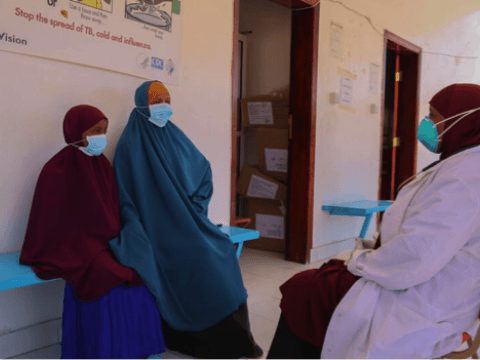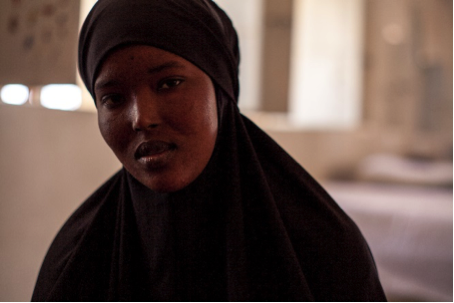Disease spreads with drought

“I was certain that I was going to die,” says 25-year old Ifrah, who is at the Galibey TB Hospital in Somaliland.
Four months ago Ifrah's life was at serious risk. She was so sick from tuberculosis; her weight had dropped dangerously - to as low as just 40 kilograms (88 pounds).
“I was too weak to walk or talk,” she says. She didn’t know she had contracted TB but she and her family knew there was something terribly wrong, that she wasn’t getting better, and that she desperately needed help. Her pastoralist family managed to catch a ride on a truck from their rural home in search of medical assistance. She was diagnosed with TB and was quickly put on chemotherapy at the Galibey Hospital in order to save her life.
World Vision TB Coordinator Dr. Mustafe Hassan helps provide treatment to TB patients with a high rate of success. However, more and more new patients keep arriving. Many are weakened by malnourishment caused by the drought and are more susceptible to disease. Photo: Brett Tarver
In addition to the burden of disease, Ifrah and her family are fighting the pangs of hunger. “Because of the drought we no longer eat meat or have milk to drink. We can only afford to eat dry rice, and we have just two meals per day instead of three,” says Ifrah.
“This devastating drought is a significant factor in new TB cases,” says Dr. Mustafe Hassan, World Vision TB Coordinator at the hospital. He continues, “Ifrah’s family has lost more than half of their animals - without which, they have no income or enough food. As a result, people become more and more malnourished, weaker and more vulnerable to the spread of diseases.”
Pastoralist families like Ifrah’s, Dr. Hassan explained, are having their livelihoods destroyed by the drought. Without water to drink, entire herds of animals are dying, putting an incredible strain on the already meager resources.
Ifrah has nearly fully recovered from tuberculosis at the Galibey TB Hospital, supported by World Vision. TB is spreading more quickly due to a devastating drought across the region. Photo: Brett Tarver
Thanks to quick and effective treatment, Ifrah has now almost completely recovered. Her tests are now negative for TB and her energy has returned. She has a strong, confident demeanor and she exudes vitality. Not only can she walk, she can also run again.
“I’m feeling really good now,” she said. “I feel happy again, and I can’t wait to go back home to my husband and twin boys.” Ifrah will also be going back home educated on TB. She has been equipped to educate her community on how to identify the signs of TB and prevent it from spreading.
While Ifrah is recovering, the ongoing impact of the drought continues. The more livestock they lose, the fewer the resources they have to properly feed and sustain themselves as a family. This is a story that is becoming more and more common as the health of families continue to be threatened across the region.
Muha, 7 with her mother Hibo, getting screened for TB at the Galibey hospital. In recent years the renowned hospital has been successful in reducing TB rates in the region but the drought poses new threat of disease. Photo: Steph Glinski
While the Galibey TB hospital has experienced success in treating patients, more and more new cases keep coming in. The hospital has experienced a 50% spike in new TB cases since the drought began. “If the impact of the drought on the people is not addressed, the risk of disease will continue to escalate,” Dr. Hassan said.
Molit, (centre)and his family being treated by Dr. Mustafa Hassan Omar, Director of the Galibey hospital in Somaliland. World Vision has supported the hospital since 2005. Somalia has the highest rate of TB in the world. Photo: Steph Glinski
More than six million people, nearly 50% of Somalia’s population is in need of immediate humanitarian assistance, World Vision is appealing for US$18.5 million in emergency funding to help 530,000 of the most vulnerable people across Somalia with targeted food security, emergency health & nutrition, livelihoods, protection, shelter and WASH programs.



